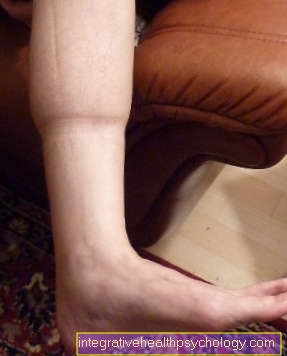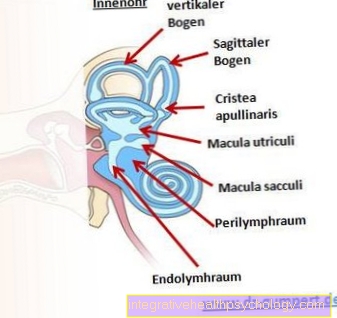West Nile fever
introduction
West Nile fever is caused by a virus that is transmitted via mosquitoes.
The symptoms are very unspecific and can easily be mistaken for other infectious diseases or the flu. The infection is often asymptomatic. This means that the person concerned does not suffer from any symptoms. In exceptional cases, however, the disease can also be fatal. The West Nile virus occurs worldwide on all five continents. However, it is very rare in Germany.

causes
West Nile fever is caused by the West Nile virus. This belongs to the flavivirus family, which also includes the yellow fever virus.
The virus is transmitted through mosquito bites. Other animals in which the virus lives are mostly birds. They serve the virus mainly as a host or as a reserve and ensure the wide spread of the virus. In rare cases, the virus is also transmitted from person to person. However, this can only happen in the case of blood transfusions, organ transplants or breastfeeding from mother to baby. However, these transmission routes are very rare.
Read more on this topic: Yellow fever
How is the disease transmitted?
The viruses are transmitted via mosquitoes and mosquitoes. There are a variety of mosquito species that can transmit this virus. Transmission between people is only possible through blood products, organ transplants, or breast milk. Because of this, people with West Nile fever do not need to be isolated.
Where does West Nile fever occur?
West Nile fever is common worldwide. Endemic areas, i.e. areas in which West Nile fever is widespread, are primarily North America and Africa.
The fever has also spread in Europe in recent years. The south and east of Europe, e.g. Greece, are affected. The infection is very rare in Germany. As a rule, those affected were infected abroad.
It is presumably too cold in Germany that the mosquitoes that transmit the virus cannot survive. In the context of the climatic changes, however, it is possible that the mosquitoes also spread in Germany. Despite the use of pesticides against mosquitoes, the spread in the endemic areas has not yet been limited.
Symptoms
In the majority of those infected, the disease has no symptoms and is not noticed at all.
Only about one in five have symptoms at all. These are then very similar to flu, which is why West Nile fever is often not identified as such, but is incorrectly dismissed as flu. Symptoms appear around 2-14 days after infection. Typical complaints are chills, fever, headache and body aches, conjunctivitis, dizziness and vomiting. Symptoms start suddenly and usually end within six days, even without treatment. Often rashes appear all over the body.
In some cases, the meninges or encephalitis may become inflamed as the infection progresses. Theoretically, these can also be fatal. However, this is rare. This affects old people or people with a suppressed immune system. If the central nervous system is affected, paralysis can also occur, which unfortunately has a poor prognosis for recovery.
Complications
The dreaded complication of an infection with West Nile fever is an involvement of the nervous system.
Initially, the meninges may become inflamed, known as meningitis. Meningitis is manifested by fever, headache, painful stiff neck and clouded consciousness. Nausea, symptoms of paralysis and seizures can also occur. The inflammation can also spread to the brain (encephalitis). In such a case, intensive medical treatment is always necessary. Another complication is paralysis, which can occur, albeit rarely, as part of West Nile fever. This paralysis is usually irreparable and persists after recovery.
Older patients in particular, but also people with a suppressed immune system, are affected by the involvement of the central nervous system. These are also more likely to be affected by a rare, fatal outcome of the disease.
Read more about this: Encephalitis
Encephalitis
Encephalitis is the medical term for inflammation of the brain. This is the most dangerous complication of a West Nile fever infection, but fortunately it is quite rare at less than one percent. Encephalitis is associated with a high fever, increased sensitivity to light, and impaired consciousness. She should always receive intensive medical care.
therapy
Therapy is symptom-oriented. This means that the individual symptoms, such as the fever or body aches are treated.
The actual cause, the virus, is not treated because there is no drug against the virus. Research is looking for a specific drug. Since it is a viral disease, antibiotics cannot be used for therapy. The body's immune system is usually able to fight the virus itself. As with the flu, you should get plenty of rest and drink plenty of fluids.
If necessary, antipyretic drugs such as paracetamol or ibuprofen can be taken. Medicines can also help with nausea. Patients do not need to be isolated as they are not infectious to others. If the central nervous system is affected or the symptoms are unusually severe, treatment will be given in a hospital. If you experience symptoms that affect the central nervous system, such as encephalitis, intensive medical treatment in the hospital is necessary, which can react quickly to possible fatal complications.
Vaccination and prophylaxis
There is currently no vaccination against the West Nile virus for humans, only for horses. Even if there is intensive research into the development of a vaccine.
That is why the best prophylaxis is to protect yourself from mosquito bites when you are in a risk area. Long clothes and mosquito spray are used for this. At night you should sleep under a mosquito net. There are also mosquito nets for doors and windows. The mosquitoes are mainly active from dusk to dawn. In some endemic areas there are programs to contain the spread of virus-transmitting mosquitoes. For this purpose, insecticides are used to destroy the mosquito breeding grounds. However, these programs often do not have the desired effect.
You may also be interested in this topic: Mosquito repellent
diagnosis
Often the diagnosis cannot be made. Since the symptoms usually only last a short time and therefore the virus is only detectable in the blood for a short period of time. The body makes antibodies against the virus in order to fight it. These can only be detected in the blood after a few days, when the symptoms have often already subsided.
West Nile fever cannot be diagnosed based on the symptoms alone, as the symptoms are very unspecific and can also be caused by other viruses. In the case of an acute illness with fever and neurological symptoms, however, the West Nile virus should also be considered as the cause if the person concerned had previously been in a risk area. Because the West Nile virus is related to other viruses, false test results in blood tests are more common.
If the central nervous system is infected in the course of the disease, the virus can also be detected in the cerebrospinal fluid (liquor).
Blood test
As mentioned earlier, West Nile fever is mainly diagnosed through a blood test. In various test procedures, either virus components, such as virus RNA, or human antibodies against the virus are detected. The virus components are only detectable at the beginning of the disease, the antibodies only after a few days.
Duration of illness
West Nile fever only lasts between 2-6 days if the course is uncomplicated and with flu symptoms. The rash can often be seen a few days longer until it heals completely. If the central nervous system is also affected, recovery takes significantly longer and varies greatly from person to person.
Can you donate blood if you have been in a risk area?
The areas at risk for West Nile fever include the USA, Egypt, Mexico, Iran, Israel and Canada.
After returning from such an area, at least four weeks must elapse before blood can be donated again. However, this rule is limited to the period from June 1st to November 30th. However, one should note that in some of these countries there is a ban of at least 4 weeks, as there are also time limits for returning from countries with low hygienic standards. For countries that are also a malaria risk area or are in a tropical area, such as Egypt, longer bans of 6 or 3 months apply.
More detailed information can be obtained from the German Red Cross.




.jpg)
























